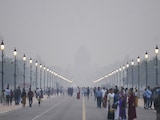Initial data from a major hospital complex in South Africa's omicron epicenter show that while Covid-19 case numbers have surged, patients need less medical intervention.
The Steve Biko and Tshwane District Hospital Complex in Pretoria had 166 new admissions between November 14 and November 29, with 42 patients currently in the Covid wards, according to a report showing the early experience of patients at the hospital group. Most originally sought treatment for ailments unrelated to the coronavirus and were discovered to have it in testing required for admission.
This only represents the first two weeks of the omicron wave in Tshwane and the "clinical profile of admitted patients could change significantly over the next two weeks," said the paper's author Fareed Abdullah, a director of the South African Medical Research Council and an infectious disease doctor at the Steve Biko hospital. The report has not been peer reviewed.
While the National Institute for Communicable Diseases has confirmed that almost all new cases in the epicenter are the variant, Abdullah and his team were not able to establish that in every instance the variant is omicron. Even so, a "reasonable assumption is being made that the cases" in this data represent infection with the new variant, Abdullah said.
Main observations include:
- Most patients in the Covid wards have not been oxygen dependent -- a departure from previous waves.
- Of 38 adults in the Covid wards on December 2, six were vaccinated, 24 were unvaccinated and eight had unknown vaccination status.
- Only a single patient on oxygen was fully vaccinated, but the intervention was required to treat chronic obstructive pulmonary disease. Two were admitted to intensive care within the past two weeks, but neither with a primary diagnosis of Covid pneumonia.
- No fewer than 80 per cent of admissions were younger than 59. Some 19% were children up to 9, and 28 per cent were patients age 30 to 39.
- Pediatric Covid wards reported no deaths over the last two weeks. Children accounted for 17 per cent of the deaths over the previous 18 months
- Ten of the patients died, or 6.6 per cent, though it hasn't been determined that omicron was the cause
- The number of deaths may increase. The trend will become clearer over the next two weeks -- enough time to see if the cases worsen.
- Average length of stay in Covid wards was 2.8 days versus 8.5 days for the past 18 months.
(Except for the headline, this story has not been edited by NDTV staff and is published from a syndicated feed.)















